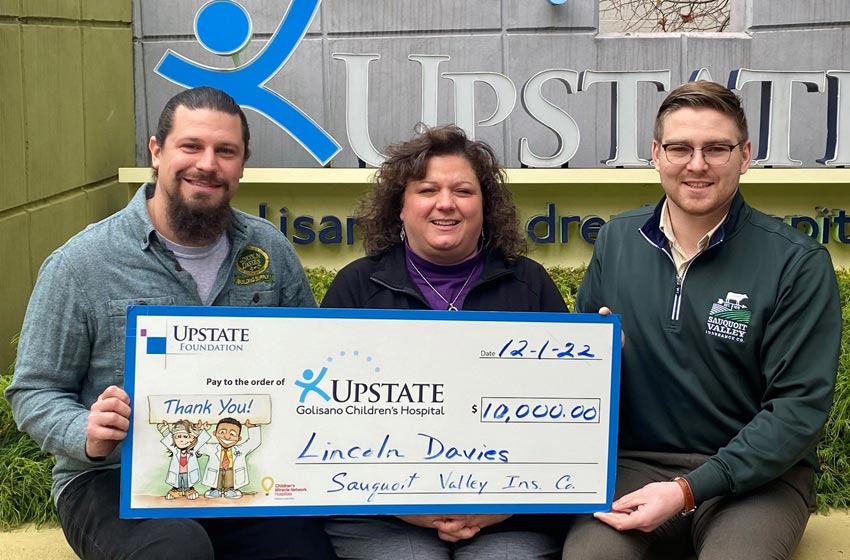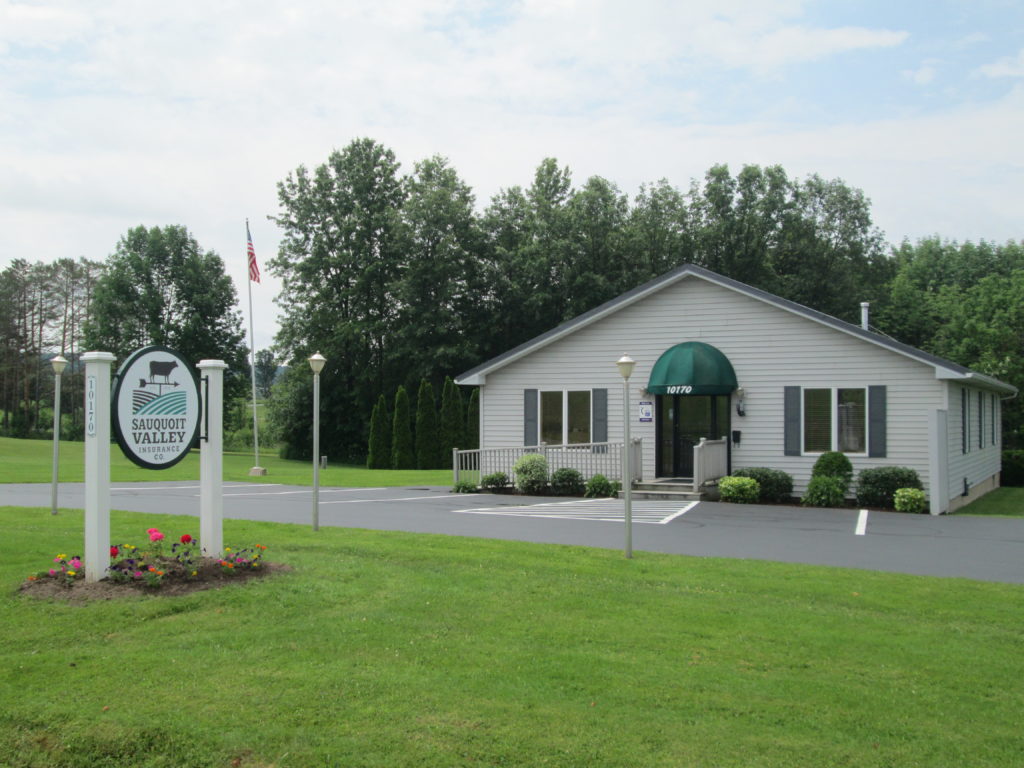Sauquoit Valley Insurance Raises $10,000 For Golisano Children’s Hospital

Pictured above Evan Jones of Lincoln Davies Building Supply, Theresa Abrams and Noah Ives of Sauquoit Valley Insurance Company.
Through the support of Lincoln Davies Fall Festival and Jeff and Mary Lloyd of Lloyd’s Concessions, Sauquoit Valley Insurance Company and Lincoln Davies Building Supply, raised $10,000.00 during the weekend event. Lloyd’s Concessions donated all prizes for the event. Sauquoit Valley and Lincoln Davies Building Supply presented a check to Golisano Children’s hospital in December. Company President, Scott Jeffers wishes to thank all who participated to make this year’s event such a great success.
Sauquoit Valley Insurance Raises $1500 For Golisano Children’s Hospital

Left to right Theresa Abrams of Sauquoit Valley Insurance Company, Joanne Jones of Lincoln Davies Building Supply and Noah Ives of Sauquoit Valley Insurance Company
Through the support of Lincoln Davies Fall Festival and Jeff and Mary Lloyd of Lloyd’s Concessions, Sauquoit Valley Insurance Company raised $1500.00 during the weekend event. Lloyd’s Concessions donated all prizes for the event. Sauquoit Valley exceeded its 2019 fundraiser and presented a check to Golisano Children’s hospital on October 18, 2021. Company President, Scott Jeffers wishes to thank all who participated to make in this years event such a great success.
Creativity and Attention to Customer Needs Sustains Longevity at Sauquoit Valley Insurance
By Barb Albert
This article was published in The Demotech Difference – Winter 2016 / Vol.2, No.1
In 1878, a group of farmers from Sauquoit, New York needed to find affordable fire insurance to protect their properties. Those farmers formed what is now Sauquoit Valley Insurance Company, a creative solution for a real need. According to current company president, Scott Jeffers, creativity is still a part of the success of the company 138 years later.
“We have to be creative and attentive to our policyholder needs,” Jeffers said. “Existence for small companies is based on the premise of understanding your culture and where you fit in the marketplace. I guess to summarize, you stay focused on what you understand and improve upon that area in your market share. Business at times has a misconception that things need to be complicated to be effective. That is not always true.
“Our direct relationship with our policyholders allows us to take a strong personal interest in our clients. That’s unusual in today’s marketplace. One advantage we have is that we write and service our own policies. We may be the only insurance company left in New York state that holds that unique status as an assessment cooperative. It gives us more options to focus on the needs of customers.”
First named Sauquoit Valley Farmers Association, the company’s original clients were all farmers. Initial coverage was for fire damage alone. By 1911, the Association had 1,673 policies amounting to nearly $4 million in insurance. Jeffers said that business has grown substantially, and even though the percentage of farms has declined over the years, they still represent an important part of the client base of the company.
“The number of farms has declined only because of the economy,” Jeffers said. “The perpetuation of the family farm is almost nonexistent today. It’s not what the kids want to do. In rare cases you’ll find the kids carry on the family farm, but that’s difficult financially for a young family. The traditional farm was seven days a week, every day of the year. Rarely did those people get away. The younger generation thinks differently about that. It’s not what they want to do.
“Despite that, we still have between 30 and 40 percent of our business in farms. Agriculture has evolved beyond the dairy. There are a lot of equestrian people out there, raising a horse or two. There are different lines of agricultural business today, whether its pork, poultry, or sheep. It’s changed. These gentlemen farms, as we refer to them today, are really a kind of hobby that didn’t exist years ago. But now people do this as a hobby, and they look at that model. They want a home, they want a barn, and they want land. We need to adapt to the changes.”
The process of raising cattle for beef is one example of the changes in modern agriculture, according to Jeffers. Those farms have to look at the science of the types of nutrition, and the genetic patterns of animals. He said that science is used to perfect beef production and represents a different spin on farms compared to 30 years ago.
“Our product lines have changed considerably,” Jeffers said. “In addition to fire coverage, you now have different coverages that are included with it. You’ve got the extra expenses coverage. A lot of this came around as homeowner programs came about. There were schedules you could put on buildings and machinery, and liability coverage that could be added. Product line has changed because of the market change. But as I sit here today, it needs to change even more.
“We’re really not as prepared as we should be to be able to provide the coverages for the different types of exposures out there. Beef, poultry, and pork farms have different types of risks. They sell animals off the hoof. They have buyers come from downstate to buy beef for their restaurants. They have butcher shops. Buyers want to know where it was raised, how it was raised, what it was fed, and the nutritional value of what the animal was fed. So it’s changed so much more than traditional farm exposure.”

The first location for Sauquoit Valley Insurance Company was the residence of company secretary Eli Birdseye in Sauquoit, New York, from 1878-1912.
Jeffers, retired from the Army Reserves in 2004, began his insurance career with his father in 1982. Together they worked at Oriskany Falls Insurance Agency until 1985 when the company was sold to Gates-Cole Insurance. Jeffers joined Sauquoit Valley Insurance Company as general manager first in 1993 and as president the follow- ing year. He believes that company presidents have a vital role in the longevity of an organization, by maintaining the financial position and in establishing the level of service.
“Our company’s philosophy to our policyholders is to establish a long term relationship,” Jeffers said. “You will build credibility and in some cases get the opportunity to know your customers beyond a policy number, and that can be really gratifying. Our customers come right into our office. We often do business like an agency. We have a counter. If they want to come in and pay their bill or want to come in and talk about their insurance, that’s fine with us. We’re here and we do what we have to do every day. We wear a lot of different hats in the process.
“You have to build trust with people. Let’s face it, our industry doesn’t have the greatest reputation out there, but I don’t think we get a fair shake on that. Our industry takes care of its own, especially in New York state. We have to make sure as with the guaranty funds and others that they are set up to make good on financial obligations. We will always see things through. We’re in the business of taking risk for a very small premium in proportion to the risk we take. And if you are able to succeed and meet your obligations promised to policyholders, then you’ve done your job.”
Jeffers said that the job of a good president or manager is to stage the company, and get it postured for successors, who will then carry the tradition over. He says that while companies do need to attract younger employees, a high value must always be placed on the experience of the senior board members. Those seasoned veterans have lived through hard times, and have been through things the younger people in the company have never seen, he said. Researching an issue, then bringing it to the table for the older board members to weigh in on, will result in decisions that are overwhelmingly beneficial. Jeffers said that is the trademark of the co-ops — they want to stay independent, so aligning vision and leaning on the wisdom of the board will help companies figure out how to make it happen.

Present office of Sauquoit Valley Insurance Company in Sauquoit, New York, since 1985
“My dad’s approach to training new people was that they understand the business from the ground up,” Jeffers said. “You need to know what people are doing, and you need to know why they are doing what they do in order to understand the whole process. You don’t just step in and say I’m the manager. When you run a report on our business or industry, what does the report mean? Where did the numbers come from, and do you know if it’s accurate? When you train people today, every day is a lesson in our business here and it has to be looked upon that way.
“I just hired a young person last January, and he spent a lot of time with me. I threw a lot of things at him, so he could gain the experience. I’ve taken him out with me on renewal calls where we sit down at the kitchen table with our customers. You’ve got to put people at ease. You let them know your obligation to them, and your standard of care. Your conduct is different because you’re looking out for them. It’s an art when you can reach people and gain their trust. Then they can open up to you and it’s a very comfortable setting. It doesn’t even have to be all business. Not everything in the business is enjoyable like this because there are some very difficult times. But my philosophy is that you always do what’s right, no matter.”
One of the future challenges Jeffers sees is the need to sustain a level of technology to compete in the marketplace. While he supports technology, he would be the first to say that he does not want to be positioned on the cutting edge. He sees a vast difference in the way different generations view technology as it relates to convenience. Within that perception of convenience, he knows that the company will be challenged with growth issues, as a direct writer since the beginning. Only now has Sauquoit Valley Insurance Company appointed an agent to sell products, a move that Jeffers believes will be beneficial to both parties.
“I think there’s always a rush to judgment when it comes to technology today,” Jeffers said. “I support technology and efficiency that comes along with it. This office 24 years ago had seven employees. We have four today. The reason for that is that we have better technology today than we did then. We’re busy all the time, and we’re always trying to balance the scales. We have administrative responsibilities inside, but we also share the same responsibility outside. Why would you want to be at the lead in technology when you can sit back and watch how new technologies go? Does what you use today work for you? If so, then why would you want to move ahead just for the sake of saying you’re with the newest version of whatever software?
“One of the important things we’re doing here is developing our own operating system in the office. There’s a lot of premium dollars you need to support a substantial software expense, so we’re developing our own operating system that I hope will be done this year. We will own it, and it won’t cost us anything other than having things changed or updated as we see fit. And that’s a long term business plan that I felt was necessary, so maybe a successor won’t have to deal with it. We try to keep it simple.”
